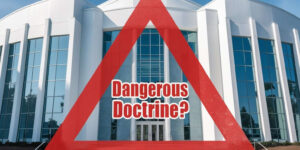10 Ways the Word of Faith Movement Went Wrong
Share:
As a product of the Word of Faith movement in the early 1980s, I will forever be indebted to the books and teachings of Kenneth Hagin Sr., Smith Wigglesworth, John G. Lake, T.L. Osborn and the like. These were holy men of integrity who turned the world upside down with their faith and teaching.
I learned how to pray for the sick by reading Osborn’s book Healing the Sick, and I learned how to resist the devil by reading Hagin’s The Believer’s Authority. In reading many biographies of Smith Wigglesworth, I have always been challenged by his utter consecration to Christ and to walk in the light of His Word whether in or out of the pulpit. I shudder to think where I would be right now if not for being influenced by these men and this movement.
That being said, as I continued to grow in the Lord and His Word, I saw several flaws in the teaching and in the movement in general. This article is not meant to dampen anyone’s faith but to bring a more balanced picture of the ways of God—especially since many have been discouraged in this movement because they did not understand the whole counsel of God (Acts 20:27) and did not have a theology that included certain things that challenged their faith.
I have found that whenever we preach or emphasize one truth of God’s Word to the exclusion of the others, it becomes a mixture and produces both good and bad fruit. For example, this has happened with the hypergrace movement, as well as the view of hyperfaith. From an overemphasis on outward holiness, we get legalism. And we come into a form of fatalism when we emphasize God’s sovereignty at the expense of human responsibility.
However, I will go on record saying that I would much rather be with people attempting to walk in faith and victory than be hanging out with depressed saints filled with unbelief and doubt. Also, like most other movements, the Word of Faith movement restored to the body of Christ a biblical truth that was neglected by the church—and in doing so, overemphasized it. But after several years, more balance comes as folks like myself “eat the meat and spit out the bones.” Also, I believe that Brother Hagin never approved of some of the excesses that came out of the faith camp—especially regarding the unbalanced teachings on prosperity that came from some of his more radical followers.
The following are some of the flaws of the Word of Faith movement from my perspective (and I realize these are generalizations that don’t fit exactly every person classified as “Word of Faith”):
1. They preach a “rights centered” gospel rather then a “stewardship centered” gospel.
Perhaps influenced by our Jeffersonian heritage of individual rights in America, the way the gospel is applied to individuals in the Word of Faith movement is based on personal rights in Christ. Although this is partially true, the New Testament balances our rights in Christ with our responsibility that goes along with these rights.
For example, in Deuteronomy 8:18, we learn that God gave believers “power to get wealth, that His may establish His covenant.” This passage clearly teaches us the primary purpose of prosperity is for the kingdom—not only for our individual comfort and pleasure. Many in the faith movement used to “claim” houses and cars and attempt to use their faith merely for their own individual needs, which, in and of itself, goes against our call to seek first His kingdom (Matt. 6:33) as a prerequisite for our individual needs and wants being fulfilled.
2. Their dispensational belief precludes the role and importance of the Old Covenant in the New Covenant age.
I heard Brother Hagin brag several times in his teaching sessions that he did not read the Old Covenant because we have a new and better covenant now in Christ. The challenge with that teaching is that he did not understand the relevance and role of the moral and civic law of God found from Exodus to Deuteronomy—especially the Ten Commandments that were repeated over and over again either exactly or in principle by the New Testament writers. Without the moral law of God, we have no standard for holiness and will lack the conviction of sin the moral law gives as our standard of holiness and ethics.
Furthermore, Hagin and others like him would only quote the Old Testament when convenient—when it comported to his view of faith. For example, he would quote Exodus 23:25, where God told the Jews He would take sickness from them, but he neglected to also teach that in order to walk in health, they had to follow the strict dietary code as found in Leviticus 11. Thus, healing for the Jews included not only claiming a promise of God but also staying away from unclean food. (In my opinion, walking in physical health also involves having a healthy diet and lifestyle—or else we are tempting God by intentionally violating His natural laws and then expecting Him to heal us.)
3. They have a semi-gnostic dualism regarding their view of God.
Word of Faith preachers have a simple view of God: Everything that is good is of God, and everything bad is from the devil.
While I totally agree God is a good God, sometimes He has to bring judgment or allow things to take place that in our natural minds may be interpreted as bad. What do Word of Faith preachers do with passages like Isaiah 45:7, in which God says He not only brings prosperity but also disaster? Or 2 Samuel 24:13, where God told King David to choose one of three calamities He would bring upon the land of Israel as punishment for his sin? Or Amos 3:6, which clearly says God sometimes brings disaster to a city? What about the book of Job, where God allows Satan to afflict Job physically with boils as well as bring disaster to other areas of his life?
I remember Brother Hagin teaching that Job doesn’t count in the New Testament because Job 42:10 says God turned the captivity of Job and that Luke 4:18 says Jesus set the captives free. That would all be fine, except for the fact that the book of James carries the life and story of Job into the New Testament for the church age—specifically, James 5:11 offers a lesson for us regarding God’s ways and dealings. (Also, without the book of Job, we have nothing to say to Christians who unexpectedly lose a loved one or experience great personal challenges and loss. Job is comforting to me as a pastor because it shows me that God is sovereign over all things—in both the good and the bad—even when it is hard to explain and understand in the natural. Furthermore, God never gave Job an explanation for why He allowed disaster to strike.)
Finally, what do Word of Faith teachers say about Revelation 2:22-23, where Jesus says that He will cast people on a bed of sickness and even strike people dead? This does not go along with the simple dualism they teach.
Now, I will be the first to say that God’s general will, as revealed in the Gospels, is for divine health (see also 3 John 2) and that, in general, He always wants us healthy in spirit, soul and body (1 Thess. 5:23) and that Jesus came for us to have an abundant life (John 10:10). But those in the Word of Faith movement have such a narrow view of the Word of God that they do not have any explanations for mysterious things that happen to us that challenge our faith. It is not always true that something bad happened to a person because they had sin (John 9:1-3) or that they didn’t get healed or calamity came to them because they lacked faith. Of course, the instance where Jesus brought sickness and death in Revelation 2:22-23 had to do with disobedience, which took people out from under the covering of the Lord (Ps. 91:1).
In summary, it is still generally God’s will to bring us health and prosperity in the context of obedience to His Word.
4. Positive confession sometimes leads to dishonesty and superficial Christianity.
I have been around many believers who are afraid to be honest and admit they are struggling with their faith. This brings people into bondage and even a form of superficial religion. Some believers are like robots—when you ask them how they are doing, they routinely say, “I am blessed and highly favored!” However, I know some of these people, and they are merely trying to keep a positive confession even though their world is falling apart.
Now, I do believe in speaking the Word of God to our challenging circumstances and not giving in to negative talk, but that is different from what James 5:16 tells us when he exhorts believers to confess their faults one to another. Positive confession is good and biblical (Prov. 18:21) as long as it doesn’t stop a person from getting pastoral counsel and being honest with fellow believers when they need prayer.
5. Their view on prosperity is only based on giving.
While it is true that the Bible teaches we reap what we sow and that if we give, it will be given back to us (Luke 6:38), one of the flaws of the Word of Faith movement is that it only teaches people one side of prosperity. I believe the church needs to equip the saints not only to give but also to get, as well as how to manage what they get while investing and saving for the future.
When we only teach the saints how to give, we limit the amount of creativity and blessing some people can experience—because without combining giving with hard work, education and an understanding of how to manage and create a budget, many folks will continue in cycles of poverty even though they may experience elements of God’s provision based on their giving. God can only bless in proportion to our ability to manage what He gives us!
In poor countries, I have found that when the only solution presented to the people for breaking poverty is “giving to the church,” the only person who becomes prosperous is the preacher. In the kingdom of God, the church is called to have a more empowering and holistic approach in regard to prosperity and breaking cycles of poverty.
6. They have faith in their faith as a principle rather than it emanating out of the person of Christ.
I have found in many instances where this movement presented faith almost as an impersonal force, like the law of gravity. This led to teachings like “having faith in your faith.” When this is taught, it can disconnect faith from intimacy with the Lord. The more I get to know a person, the more I can trust them. Faith is not a force. It is a result of growing in simple trust based on growing in an experiential knowledge of the Lord. Faith is relational. It is not an impersonal force.
7. Some pastors have modeled their church preaching after these “specialists” in the body.
Brother Hagin, T.L. Osborn, Smith Wigglesworth and the like were not typical pastors called to oversee a flock. Thus, they were able to preach based on their primary assignment, which was faith and healing.
The challenge is, many pastors who don’t understand this began to mimic these great men of God and attempted to build congregations only around those three themes—faith, prosperity and healing. That is OK if you are a traveling teacher or evangelist, but a congregation needs to have a balanced diet of the Word that includes the whole counsel of God (Acts 20:27). A pastor needs to preach on healing but also holiness; faith but also tests and trials; moving mountains but also marriage; giving financially but also stewardship and hard work. I love preaching on faith and healing, but as a pastor I often had to preach subjects I really did not have a great passion for but knew others needed to hear to fully mature in the Lord.
8. It can put guilt and bondage on believers.
I have heard of many people who walk around in guilt because they are not healed or because they are struggling financially. In some cases, I have even heard of famous faith preachers who checked into a hospital under a different name so word would not get out that they were sick and under a doctor’s care!
We need to have a culture of faith in our churches, but we also have to engender a culture of humility, honesty and brokenness—admitting that we don’t always walk in victory over sin and sickness as well as making allowances for mystery The fact is, we don’t always understand why certain things happen to believers. (See again the book of Job.)
9. It can produce independent, narcissistic believers.
When the Word of Faith movement went from a stewardship-centered gospel to a rights-centered gospel, it also attracted many self-focused people—people who used God as an excuse for their lavish lifestyles and who frowned upon those living in simplicity. Unfortunately, this teaching often appealed to the narcissistic tendencies in all of us, and many large ministries were built more upon the American Dream of having a nice house and a nice car than upon taking up our cross and following Jesus. Jesus said in Luke 14:33 that we have to lose everything in order to be His disciple, but many in this movement only focus on what we gain. Truly, you can’t be resurrected until you first go to the cross!
10. It is not connected to the cultural mandate of Genesis 1:28.
Last but not least, the Word of Faith movement did not go far enough. Instead of limiting faith to merely believing for individual healing and health, the Word of God teaches that our faith should also transform whole cities and subdue kingdoms! (See Isaiah 61:4 and Hebrews 11:33.) The gospel is a blueprint to disciple and baptize whole people groups, not just individuals (Matt. 28:19-20). It not only deals with individual sinners but systemic evil. The Word of Faith movement, though, brings faith for individual victory but doesn’t say much about corporate victory. However, regarding the community of believers, faith is also based on the corporate culture and anointing of a congregation. (First Corinthians 11:27-32 and Hebrews 3-4 teach that whole congregations can be negatively affected by a culture of unbelief or disobedience.)
The Word of Faith movement in general separated the gospel from the kingdom and, in doing so, made it more about individual prosperity then societal transformation. When you separate the gospel from the kingdom, you tend to become more self-focused because the Good News gets disconnected from our responsibility to steward the earth. With the gospel of the kingdom, we believe in individual, congregational and societal transformation!
Finally, I believe with all of my heart that there was more good than bad in the Word of Faith movement and that it was God’s intention that biblical faith for the supernatural be restored back to the church. All of us only know in part and see through a glass darkly—even the apostle Paul (1 Cor. 13:9,12). Consequently, it often takes years for the body of Christ to discern how to have balance when old truths are restored. One of the keys to life is balance—and biblical balance cannot come until we attempt to embrace the whole counsel of God!
Joseph Mattera is overseeing bishop of Resurrection Church, Christ Covenant Coalition, in Brooklyn, N.Y. You can read more on josephmattera.org or connect with him on Facebook or Twitter.
Share:






































